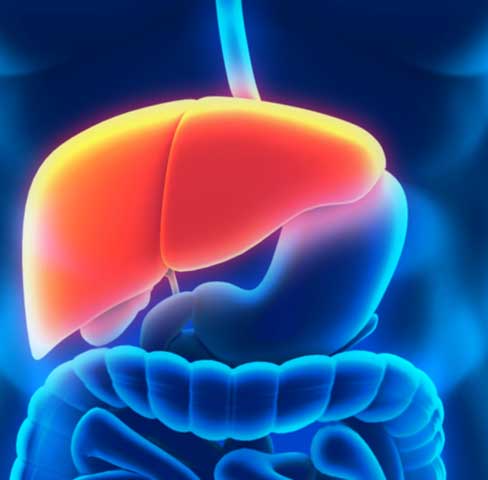OUR MISSION | TO PROVIDE AFFORDABLE, RELIABLE, BEST QUALITY INTERNATIONAL MEDICAL TOURISM.

LET US CONNECT YOU WITH HEALTH CARE
Liver Transplant
Your liver is your largest internal organ and performs several critical functions, including:
- Removing bacteria and toxins from the blood
- Preventing infection and regulating immune responses
- Processing nutrients, medications and hormones
- Producing bile, which helps the body absorb fats, cholesterol and fat-soluble vitamins
- Making proteins that help the blood clot
Liver transplant is usually reserved as a treatment option for people who have significant complications due to end-stage chronic liver disease. In rare cases, sudden failure of a previously normal liver may occur.
The number of people waiting for a liver transplant greatly exceeds the number of available deceased-donor livers.
The human liver regenerates and returns to its normal size shortly after surgical removal of part of the organ. This makes living-donor liver transplant an alternative to waiting for a deceased-donor liver to become available.
Types
- Living-donor liver transplant
Why it’s done
Normal liver vs. liver cirrhosis
Liver failure may happen quickly or over a longer period of time. Liver failure that occurs quickly, in a matter of weeks, is called acute liver failure (fulminant hepatic failure) and is usually the result of medication-induced liver injury.
Although a liver transplant may treat acute liver failure, it is more often used to treat chronic liver failure. Chronic liver failure occurs slowly over months and years.
Chronic liver failure may be caused by a variety of conditions. The most common cause of chronic liver failure is scarring of the liver (cirrhosis), a process in which scar tissue replaces normal liver tissue and impairs liver function. Cirrhosis is the most frequently cited reason for a liver transplant.
Major causes of cirrhosis leading to liver failure and liver transplant include:
- Hepatitis B and C.
- Alcoholic liver disease.
- Nonalcoholic fatty liver disease.
- Genetic diseases affecting the liver (including hemochromatosis and Wilson’s disease).
- Diseases that affect the bile ducts (the tubes that carry bile away from the liver), such as primary biliary cirrhosis, primary sclerosing cholangitis and biliary atresia. Biliary atresia is the most common reason for liver transplant among children.
Liver transplant may also treat certain cancers that originate in the liver (primary liver cancers).
Risks
Complications of the procedure
Liver transplant surgery carries a risk of significant complications. There are risks associated with the procedure itself as well as with the drugs necessary to prevent rejection of the donor liver after the transplant.
Risks associated with the procedure include:
- Bile duct complications, including bile duct leaks or shrinking of the bile ducts
- Bleeding
- Blood clots
- Failure of donated liver
- Infection
- Rejection of donated liver
- Mental confusion or seizures
Long-term complications may also include recurrence of liver disease in the transplanted liver.
Anti-rejection medication side effects
After a liver transplant, you’ll take medications for the rest of your life to help prevent your body from rejecting the donated liver. These anti-rejection medications can cause a variety of side effects, including:
- Bone thinning
- Diabetes
- Diarrhea
- Headaches
- High blood pressure
- High cholesterol
Because anti-rejection drugs work by suppressing the immune system, they also increase your risk of infection. Your doctor may give you medications to help you fight infections.
How you prepare
Choosing a transplant center
If your doctor recommends a liver transplant, you may be referred to a transplant center. You’re also free to select a transplant center on your own or choose a center from your insurance company’s list of preferred providers.
When you’re considering transplant centers, you may want to:
- Learn about the number and type of transplants the center performs each year
- Ask about the transplant center’s liver transplant survival rates
- Compare transplant center statistics through the database maintained by the Scientific Registry of Transplant Recipients
- Understand the costs that will be incurred before, during and after your transplant. Costs will include tests, organ procurement, surgery, hospital stays, and transportation to and from the center for the procedure and follow-up appointments
- Consider additional services provided by the transplant center, such as coordinating support groups, assisting with travel arrangements, helping with local housing for your recovery period and offering referrals to other resources
- Assess the center’s commitment to keeping up with the latest transplant technology and techniques, which indicates that the program is growing
Evaluation
After you’ve selected a transplant center, you’ll be evaluated to determine whether you meet the center’s eligibility requirements for a liver transplant. Each transplant center has its own eligibility criteria. If you aren’t accepted at one transplant center, you may undergo evaluation at another center.
The goals of the evaluation process are to determine whether you:
- Are healthy enough to have surgery and tolerate lifelong post-transplant medications
- Have any medical conditions that would interfere with transplant success
- Are willing and able to take medications as directed and follow the suggestions of the transplant team
Specific tests, procedures and consultations you may undergo include:
- Laboratory tests, including blood and urine tests to assess the health of your organs, including your liver
- Imaging tests, such as an ultrasound of your liver
- Heart tests to determine the health of your cardiovascular system
- A general health exam, including routine cancer screening tests, to evaluate your overall health
- Nutrition counseling with dietitians who assess your nutritional status and make recommendations regarding nutritional intake before and after transplant
- Psychological evaluation to assess and treat any underlying issues, such as depression or anxiety, and determine whether you fully understand the risks of a liver transplant
- Meetings with social workers who assess your support network to determine whether you have friends or family to help care for you after transplant
- Addiction counseling to help people with alcohol, drug or tobacco addictions to quit
- Financial counseling to help you understand the cost of a transplant and post-transplant care and to determine what costs are covered by insurance
Once these tests and consultations are completed, the transplant center’s selection committee meets to discuss your situation. It determines whether a liver transplant is the best treatment for you and whether you’re healthy enough to undergo a transplant.
If the answer to both questions is yes, then you’re placed on the liver transplant waiting list.
What you can expect
Before the procedure
Being placed on the waiting list
Doctors use results of liver function tests and other factors to determine your prognosis and your place on the liver transplant waiting list.
Your prognosis is often called your Model for End-Stage Liver Disease (MELD) or Pediatric End-Stage Liver Disease (PELD) score for children younger than age 12.
MELD scores range from 6 to 40. The scores estimate the risk of death within 90 days without a transplant. The higher your MELD score, the more dire your situation.
Organs are allocated according to MELD scores and stratified by blood type. People with higher MELD scores are generally offered donated livers first. Time spent on the liver transplantation waiting list is used to break ties among people with the same MELD scores and blood type.
Some liver conditions, such as liver cancer, may not result in a person getting a high MELD score. The transplant center can request additional MELD points for people with specific diseases if they meet defined exception criteria.
In addition, adults with acute liver failure are exempted from the MELD-based donor organ prioritization system and may be placed higher on the list according to their disease status.
Waiting for a new liver
The wait for a donor liver can vary greatly. Some people wait days, while other wait months or may never receive a deceased-donor liver.
As you wait for a new liver, your doctor will treat the complications of your liver failure to make you as comfortable as possible.
Complications of end-stage liver failure are serious, and you may be frequently hospitalized. If your liver deteriorates, your MELD score is updated.
Living liver donors
A small percentage of liver transplants are done each year using a portion of a liver from a living donor. Living-donor liver transplants were initially used for children needing a liver transplant due to the scarcity of appropriately sized deceased-donor organs. Now, it has also become an important option for adults who have end-stage liver disease.
While access to deceased-donor liver transplant is determined primarily by the severity of your liver disease, access to living-donor liver transplant is determined primarily by identification of a living donor who is healthy and able to safely undergo a major surgical procedure and is also the right size and blood type.
Most living liver donors are close family members or friends of the liver transplant candidate. If you have a family member or friend who is willing to donate part of his or her liver to you, talk to your transplant team about this option.
Living-donor transplants have good results, just as transplants using livers from deceased donors. But finding a good living liver donor match is difficult due to restrictions on the donor’s age, blood type, size and health. The surgery also carries significant risks for the donor.
Your transplant team can discuss the benefits and risks with you and the potential donor.
Domino liver transplant
Another, less common, type of living-donor liver transplant is called a domino liver transplant. In a domino liver transplant, you receive a liver from a living donor who has familial (hereditary) amyloidosis. Familial amyloidosis is a very rare disorder in which abnormal protein deposits accumulate and eventually damage the body’s internal organs.
The donor with familial amyloidosis receives a liver transplant to treat his or her condition. Then, the donor can give his or her liver to you in a domino liver transplant, because the liver still functions well. You may eventually develop symptoms of amyloidosis, but it usually takes decades to develop.
Doctors usually select recipients who are 60 years old or older and who aren’t expected to develop symptoms before the end of their natural life expectancy. After your transplant, doctors will monitor you for signs of the condition.
Doctors will evaluate you to determine if you may be a candidate for a domino liver transplant or if another procedure would be more appropriate for your condition.
Staying healthy
Whether you’re waiting for a donated liver or your transplant surgery is already scheduled, work to stay healthy. Being healthy and as active as you’re able can make it more likely you’ll be ready for the transplant surgery when the time comes. It may also help speed your recovery from surgery. Work to:
- Take your medications as prescribed
- Follow your diet and exercise guidelines
- Keep all appointments with your health care team
- Stay involved in healthy activities, including relaxing and spending time with family and friends
Stay in touch with your transplant team, and let them know of any significant changes in your health. If you’re waiting for a donated liver, make sure the transplant team knows how to reach you at all times. Keep your packed hospital bag handy, and make arrangements for transportation to the transplant center in advance.
During the procedure
-
Living liver donor procedure
-
Living-donor liver organ regeneration
Deceased-donor liver transplant
If you’re notified that a liver from a deceased donor is available, you’ll be asked to come to the hospital immediately. Your health care team will admit you to the hospital, and you’ll undergo an exam to make sure you’re healthy enough for the surgery.
Liver transplant surgery is done using general anesthesia, so you’ll be unaware during the procedure.
The transplant surgeon makes a long incision across your abdomen to access your liver. The location and size of your incision varies according to your surgeon’s approach and your own anatomy.
The surgeon disconnects your liver’s blood supply and the bile ducts and then removes the diseased liver. The donor liver is then placed in your body, and blood vessels and bile ducts are reattached. Surgery can take up to 12 hours, depending on your situation.
Once your new liver is in place, the surgeon uses stitches and staples to close the surgical incision. You’re then taken to the intensive care unit to begin recovery.
Living-donor liver transplant
If you’re receiving a liver transplant from a living donor, surgeons will transplant a portion of the donor’s liver in your body.
Surgeons first operate on the donor, removing the portion of the liver for transplant. Then surgeons remove your diseased liver and place the donated liver portion in your body. They then connect your blood vessels and bile ducts to the new liver.
The transplanted liver portion in your body and the portion left behind in the donor’s body regenerate rapidly, reaching normal volume within a couple months.
After the procedure
After a liver transplant
After your liver transplant, you can expect to:
- Possibly stay in the intensive care unit for a few days. Doctors and nurses will monitor your condition to watch for signs of complications. They’ll also test your liver function frequently for signs that your new liver is working.
- Spend 5 to 10 days in the hospital. Once you’re stable, you’re taken to a transplant recovery area to continue recuperating.
- Have frequent checkups as you continue recovering at home. Your transplant team designs a checkup schedule for you. You may undergo blood tests a few times each week at first and then less often over time.
- Take medications for the rest of your life. You’ll take a number of medications after your liver transplant, many for the rest of your life. Drugs called immunosuppressants help keep your immune system from attacking your new liver. Other drugs help reduce the risk of other complications after your transplant.
Expect six months or more recovery time before you’ll feel fully healed after your liver transplant surgery. You may be able to resume normal activities or go back to work a few months after surgery. How long it takes you to recover may depend on how ill you were before your liver transplant.
Results
Survival rates after liver transplant
Your chances of a successful liver transplant and long-term survival depend on your particular situation.
In general, about 70 percent of people who undergo liver transplant live for at least five years. That means that for every 100 people who receive a liver transplant for any reason, about 70 will live for five years and 30 will die within five years.

 +393334490384
+393334490384 BestMedicalSurgery
BestMedicalSurgery
 Telegram
Telegram







 +442033184026
+442033184026 +19299992153
+19299992153 +37495992288
+37495992288 +380947116766
+380947116766 +6531593709
+6531593709 +48226022326
+48226022326 +48226022326
+48226022326 +556140426941
+556140426941
